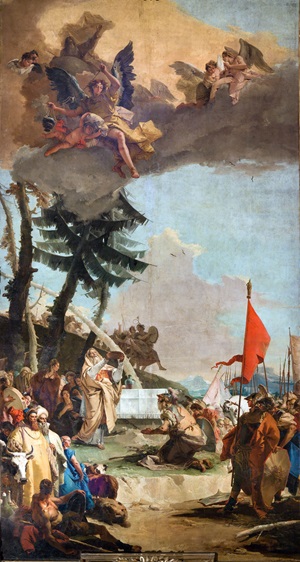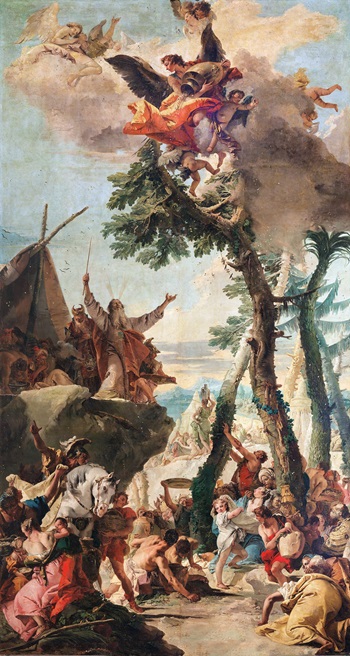An Unforgettable Trip
Giambattista Tiepolo in Verolanuova (Brescia)
A Tale by Maurilio
Lovatti
It was only June, but the summer of 1741 was shaping up to be a very hot
one. The road from Brescia to Verolanuova was quite bumpy, and Tiepolo's
carriage was slow. The sun was sinking low on the horizon, painting the
wheat fields ripe for harvest red. The painter was anxious, even though
Lorenzo had told him to stay calm: they would reach the countess's palace
before dark.
He trusted Lorenzo implicitly. He was his coachman, but also served as his
groom and bodyguard. A great saving, he often told his friends. He felt
comfortable traveling with him: he was tall and broad, but very agile, and
always carried a sharp dagger at his belt. And he had the same name as his
favorite son. The boy was only five years old, but when he took him to see
paintings in churches, he always asked a thousand questions and hung on
his every word. He felt a special tenderness for him, which he couldn't
quite explain. Maybe I'm just getting old, he said to himself.
It still seemed like a dream to him. Giuseppe, Countess Elisabetta Grimani Gambara's secretary, had arrived in Venice on a cold spring day. Small, thin, with large, piercing black eyes, he had struck him as someone afraid even of his own shadow. In front of the fireplace, sipping a glass of wine, he had explained the countess's wish in great detail. She wanted two gigantic paintings for the church of San Lorenzo. One, however, was to depict the fall of the manna in the desert. The countess, his secretary had told him, had been on a pilgrimage to Rome with the Count for the Jubilee of 1725, and had seen a painting by an Austrian artist — Giuseppe couldn't remember the name — in the church of Santa Maria in Vallicella, and had been deeply impressed. "It was too high, and some details weren't clear," Countess Elisabetta had repeated several times. But she was certain that Tiepolo could do even better. Or at least that's what her secretary said. The painter was flattered and enthusiastic, both for the opportunity awaiting him and for the salary, which was significantly higher than what the churches of Venice paid him. A wife and ten children to support were still a concern, even if the situation had certainly improved in recent years. And now he was about to arrive in Verolanuova. He felt elated, giddy with happiness: his dream was about to come true. He would be the Countess's guest for a week.
Suddenly, the
carriage lurched. A shrill, high-pitched noise. It was especially
disturbing. Lorenzo quickly stopped the horses and jumped down to check
the wheels.
"The axle on the rear wheels is breaking", he commented
laconically.
A dirty, ragged little girl was filling a basket with dry twigs for the
fire.
"Which is the nearest town?" Lorenzo asked
authoritatively, without greeting her.
"Offlaga," the girl
replied fearfully, pointing in the direction, "on foot it takes me
almost an hour. By carriage, I don't know, but there, behind that grove,
is the inn".
We were fortunate in our misfortune, Lorenzo thought. He skillfully guided
the carriage slowly into the inn's courtyard.
"Let's have a boy sent to let the countess know we'll be arriving
tomorrow", he added to reassure the painter.
The inn was large. Next to the stables for changing horses, the main
building appeared solid and imposing, though the walls were rather old and
in poor condition. On the ground floor, the large hall was filled with
wooden planks, almost all of which were empty at that hour. The large
fireplace was out, but the back wall was quite blackened by smoke. Next
door, another large room could be glimpsed, with numerous straw mattresses
where travelers spent the night. The innkeeper informed him that there
were only two bedrooms upstairs for the gentlemen, but one was already
occupied. Lorenzo would have to settle for sleeping in the common room. He
wasn't particularly pleased, but he projected a confident air: "The
important thing is that the painter has suitable accommodations."
The dinner was simple but tasty. After a glass of red wine, rather acidic
to be honest, Tiepolo, candle in hand, climbed the wooden stairs, which
creaked ominously with every step. As soon as he entered his room, he
locked the door. It was a thick wooden door, but warped, so much so that
through a crack above the hinge he could see the hallway, or rather, he
would have been able to see it if it hadn't been so dark. He was tempted
to call Lorenzo and ask him to sleep on the floor next to him. But he was
ashamed of his fears and didn't. He took a cloth from his bag to cover the
mattress, which seemed clean enough. He knew that in such cases, the risk
was of catching fleas or some other parasite.
He was about to fall asleep when he heard a knock on the door. Panic
gripped him. He wanted to scream, to call Lorenzo. But he was afraid of
making a fool of himself.
"Open up, please, I need to speak to you",
came from a soft, worried voice.
He peered through the crack: a lone man, wearing a shabby, worn cloak,
looked poor, from what he could see in the dim candlelight. He didn't seem
dangerous, but he knew well that appearances can be deceiving.
"What do you want?"
"I need to talk to you. Let me in, please!."
It was just a whisper, he seemed afraid.
"About what?"
"I want to offer you a deal... but let me in, they mustn't hear us."
He couldn't explain why, but something made him trust him. He was
surprised at himself, usually so cautious, and opened the latch. The
stranger entered and from under his cloak pulled out a bulky, dirty woolen
bag. He handed it to him.
"Look. It's 500 sequins."
Tiepolo carefully opened the bag. From the straw, he took out a coin and
examined it carefully by the candlelight. It seemed authentic: a gold
sequin from the Republic of Venice. An enormous sum, the painter thought,
more than double what the Gesuati Fathers paid me for The
Glory of Saint Dominic.
"My name
is Antonio. I'm from Sale Marasino, a town on Lake Iseo. My father was a
wealthy merchant. He died ten days ago. My three brothers made a deal with
the notary to exclude me from the inheritance. They wanted to make me look
crazy, claiming I'd been seriously ill and delirious with fever. But I
found out. I knew where my father was hiding the gold coins. I ran away,
disguised as a peasant. I walked at night and slept hidden in the wheat
fields. My brother, however, knows Count Calepio, who convinced the Mayor
of Brescia to send out guards. If they find me with the money, they'll
hang me." He was terrified. "I propose this: if you help
me, I'll leave you 150 gold coins."
«Ma come posso aiutarvi?»
"How long are you staying in Verolanuova with the countess?"
How did she know where I'm going, he wondered. But the answer flashed to
him immediately. Lorenzo, when he drinks too much, always ends up talking
too much.
"She invited me for a week."
"On the way back, you must pass through Mantua and stay there for
five days. If I don't arrive in Mantua, the 500 sequins remain yours. If I
arrive, you return 350 to me, and the rest are your reward."
"To Mantua? But it's imperial territory, the Austrians are there.
How can I explain that I'm passing through there on my way back to Venice?"
"Make up an excuse. You're a famous painter, and the guards
certainly won't search your carriage at the border. And besides, you're
not at risk; if they arrest me in the meantime, all the sequins will
remain yours. Better than my brothers!"
"It's a golden opportunity", thought Tiepolo. The next
morning, after repairing the carriage, he hid the bag in the secret
compartment under his seat.
For Tiepolo, the week in the Countess's palace was exhilarating, an irrepressible joy, like magic... The countess treated him with great consideration. She invited him to dinners and parties in the palace's lavishly lit hall. He remembered when, as a child, his father would tell him that, if he were good, he would take him in the evenings to see the illuminated windows of the noble palaces on the Canal Grande. Except that now he was at the nobles' party. After long discussions with the countess and several visits to the church, they agreed on the content of the two large canvases. The countess also paid him a substantial advance, after the painter had promised to return to Verolanuova in September with some assistants and to work uninterrupted until the paintings were finished.
In Mantua, the
inn near the church and convent of Santa Maria del Gradaro was
splendid. It was nothing like the usual inns: everything was clean, the
rooms were bright, and there were even sheets. Sure, the prices were more
than triple, but they were nothing compared to what he would earn. Tiepolo
visited Mantua for three days.
When he returned to the inn toward evening, the innkeeper met him, deeply
concerned. Some strangers had entered his room and trashed everything. The
sight he saw was disturbing. Pillows torn to pieces, clothes strewn
everywhere, the chest emptied. "They came looking for the sequins,
but they didn't find them." He immediately thought this, but
didn't say it.
The next morning he ordered Lorenzo to leave for Venice. During the
journey he let his doubts run free: had Antonio regretted promising him
such a high fee? Or perhaps, while drunk, had he confided in someone about
his deal with him? Maybe they had even killed him. He would have been very
sorry. Deep down, he had seemed like a good man. He would never know. But
what comforted him was knowing that the 500 zecchini, along with
the countess's advance, were safe under his control.
HISTORICAL
NOTE: The two large canvases by Giambattista Tiepolo preserved in the
Basilica of San Lorenzo Martire in Verolanuova (The Fall of the
Manna and The Sacrifice of Melchizedek) were painted in Venice,
as evidenced by archival documents, and then sent to Verolanuova. There is
no evidence that the great painter ever stayed in the palace of the noble
Gambara family. This is therefore a literary fiction. However, the other
biographical information relating to the painter is true, and all the
historical references contained in the story are plausible. Tiepolo's
journey as described never occurred, but everything could have plausibly
happened exactly as described. (m. l.)
Maurilio Lovatti La fuga (medieval tale in italian)

